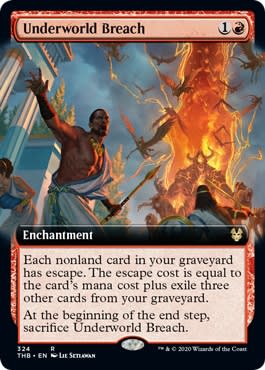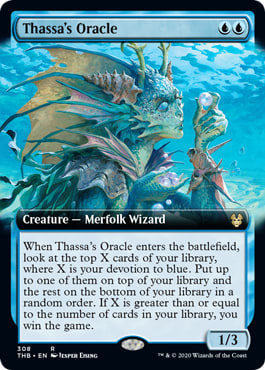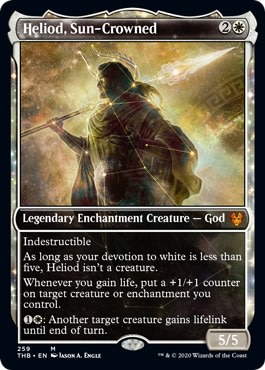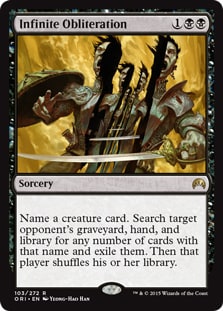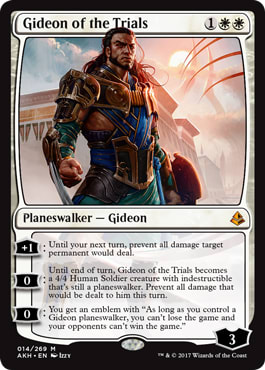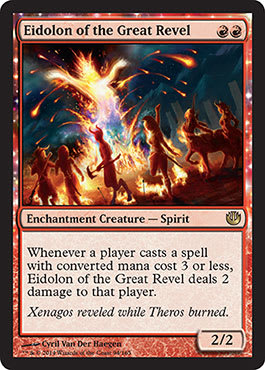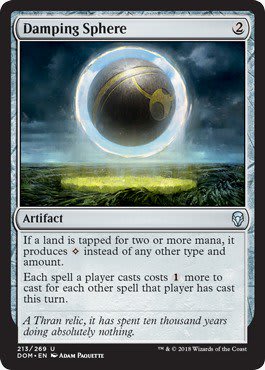It's not often that a single set changes a format so much, but Theros Beyond Death has taken Pioneer from a wild world of fair decks from across the spectrum of aggro to control and twisted it into a combo wasteland in relatively short order.
Lotus Breach Combo | Pioneer | Brent Vos, 4th Place Player's Tour Brussels
- Creatures (15)
- 1 Thassa's Oracle
- 2 Satyr Wayfinder
- 4 Arboreal Grazer
- 4 Fae of Wishes
- 4 Vizier of Tumbling Sands
- Instants (3)
- 1 Dig Through Time
- 2 Blink of an Eye
- Sorceries (16)
- 4 Hidden Strings
- 4 Pore Over the Pages
- 4 Strategic Planning
- 4 Sylvan Scrying
- Enchantments (3)
- 3 Underworld Breach
Underworld Breach has pushed the Lotus Field combo decks from "cute" to "terrifying" in short order, and word on the street is that the deck is going to be everywhere at Player's Tour Phoenix this weekend. It also feels much more like a Modern deck than a Pioneer deck, with non-interactive very long turns that result in the combo player drawing most of their deck and then winning.
Dimir Inverter | Pioneer | Dylan Donagan, Player's Tour Phoenix
- Creatures (7)
- 3 Thassa's Oracle
- 4 Inverter of Truth
- Planeswalkers (4)
- 4 Jace, Wielder of Mysteries
- Instants (17)
- 1 Hero's Downfall
- 2 Censor
- 2 Mystical Dispute
- 4 Dig Through Time
- 4 Fatal Push
- 4 Opt
- Sorceries (5)
- 1 Thought Erasure
- 4 Thoughtseize
- Enchantments (2)
- 2 Omen of the Sea
- Lands (25)
- 3 Swamp
- 5 Island
- 1 Ipnu Rivulet
- 2 Choked Estuary
- 2 Fetid Pools
- 4 Drowned Catacomb
- 4 Fabled Passage
- 4 Watery Grave
*(Full sideboard quantities not available yet due to how public decklists work)
Thassa's Oracle has combined with silly bulk mythic Inverter of Truths to give the format it's Splinter Twin variant, a Dimir Control-Combo deck that plays much of the best fair interaction in the format, ending in a two-card combo kill that is turbocharged by Dig Through Time. This was the most successful deck at both Player's Tour events and SCG Tour Richmond last weekend and is the de facto "best deck" in the format currently.
Heliod Devotion | Pioneer | Andrew Elenbogen , Player's Tour Phoenix
- Creatures (24)
- 4 Knight of the White Orchid
- 4 Thraben Inspector
- 4 Arcanist's Owl
- 4 Walking Ballista
- 2 Anafenza, Kin-Tree Spirit
- 2 Daxos, Blessed by the Sun
- 4 Heliod, Sun-Crowned
- Planeswalkers (3)
- 3 Gideon of the Trials
- Spells (7)
- 1 Elspeth Conquers Death
- 2 Baffling End
- 2 Mastery of the Unseen
- 2 Stasis Snare
- Lands (26)
- 18 Plains
- 2 Castle Ardenvale
- 2 Idyllic Grange
- 4 Nykthos, Shrine to Nyx
*(Full sideboard quantities not available yet due to how public decklists work)
And of course, Heliod, Sun-Crowned in conjunction with Walking Ballista has spurred a number of new archetypes looking to take advantage of the infinite combo; amusingly enough this was the most hyped of the new combos but has taken a backseat compared to Thassa's Oracle and Underworld Breach.
All these new combos put a lot of pressure on the format, as if you don't show up with the right sort of answers you can find yourself quickly unprepared. For the first week or two we didn't really know what the optimized builds of these decks looked like, making it very difficult to prepare, but now we have a much better idea and can start to mount a defense.
Let's take a look at some cards that really stand out at combating these three combo decks.
Against Lotus Breach: C+
Against Dimir Inverter: A+
Against Heliod Devotion: B+
While it's easy to overlook because we are much more familiar with Unmoored Ego and Lost Legacy, Infinite Obliteration is actually far superior when facing most of these combo decks. Both Unmoored Ego and Lost Legacy put you at a significant disadvantage when the card you are naming is in your opponents hand as they are always both tempo and card disadvantage. However, with Infinite Obliteration you actually come out even on card advantage if you can spike the card in your opponent's hand.
Resolving one of these against Dimir Inverter puts them in the awkward spot of needing to beat you with one of their significantly weaker alternate win conditions, which your deck is hopefully set up to beat. Removing Heliod Devotion's ability to combo is very good if you are able to beat them in a fair game without worry of being comboed, but won't do much if you can't beat their fair plan. Sideboard accordingly. Where Infinite Obliteration comes up short is against Lotus Breach, but even then just removing their Fae of Wishes will make it more complicated to assemble a kill.
As a side note Infinite Obliteration naming Niv-Mizzet Reborn is also excellent against those decks if you struggle to beat their long game.
Against Lotus Breach: C-
Against Dimir Inverter: A+
Against Heliod Devotion: F
Gideon of the Trials is perhaps one of the best cards you can have against Dimir Inverter. Once you create an emblem, you put them in the very difficult spot of needing to remove the Gideon before they combo, and Gideon's plus ability can lock down an Inverter of Truths that would look to attack it. The fact that it's a solid sticky threat makes it even more exciting.
However, Gideon isn't much of a speed bump against Lotus Breach or Heliod Devotion. Lotus Breach will often draw their whole deck before killing you, letting them find a Blink of an Eye or something, and Heliod Devotion can just combo kill the Gideon and then you, while having plenty of creatures to attack Gideon down as well.
Against Lotus Breach: A+
Against Dimir Inverter: B+
Against Heliod Devotion: C-
Forever the bane of Storm decks in older formats, Eidolon of the Great Revel combines great damage output and a good body while turning off Lotus Breach's ability to combo. It's hard to imagine a better card to play against them as long as you are applying some sort of pressure.
While not the combo knockout blow it is against Lotus Breach, Eidolon of the Great Revel is still a great threat against Dimir Inverter that can guarantee damage and help bring them to dead before they get to combo kill you. There's certainly less good burn in Pioneer than Modern, but Eidolon is guaranteed value even if they kill it immediately. Otherwise against Heliod Devotion Eidolon is only medium because they have so many quality blockers.
Against Lotus Breach: A
Against Dimir Inverter: D
Against Heliod Devotion: C-
Another phenomenal aggressive card against Lotus Breach Combo, Tomik, Distinguished Advokist amusingly prohibits your opponent from targeting their Lotus Field with Hidden Stirrings, Vizier of Tumbling Sands, or Thespian Stage. While this is not insurmountable, the fact that Tomik also gets to attack for two and only costs two mana is quite the nice little package.
Tomik is not nearly as exciting against Dimir Inverter or Heliod Devotion, with evasion being nice against the latter, but realistically it's still a decent beater that is never that bad. You can certainly do worse.
Against Lotus Breach: A+
Against Dimir Inverter: F
Against Heliod Devotion: F
While it may be the most narrow card we'll look at today, it's hard to find a better card against Lotus Breach combo. Not only does Damping Sphere completely invalidate Lotus Field as a mana producer, but the spell tax also makes it exceedingly difficult for them to do much without directly removing it. That's basically exactly what you're looking for out of your cheap, colorless, two mana hate card.
On the other hand, Damping Sphere does nothing against Dimir Inverter, Heliod Devotion, or basically any other deck in the format, making it extremely narrow. However, if you're looking for a good colorless card against Lotus Breach it's hard to do better than Damping Sphere.
Have A Plan!
The most important thing to recognize however when bringing in any of these sideboard hate cards is that each card will not win the game by itself. Too often players think that drawing a hate card is auto win, when against any good combo deck piloted by a talent pilot it is nothing more than another impediment to overcome. All three of these combo decks are too powerful and resilient to completely fold to a single piece of hate. As such, you need to evaluate how each hate piece will factor into your decks overall plan of winning the game.
Infinite Obliteration against Heliod, Sun-Crowned is a great example. If you resolve an Infinite Obliteration against them and name Heliod they will no longer be able to combo. But can you beat the rest of their deck? Especially when you've taken an entire turn off to cast Infinite Obliteration? After Infinite Obliteration resolves, the matchup switches from being a combo matchup to a midrange battle; is that a battle you're ready to win?
Think about what the game is going to look like both before and after you cast your hate card, and envision how the game is going to end so you know what you will be working towards. A hate card without a plan is just a speedbump, but a hate card with a plan usually leads to a win.
Good luck!
















